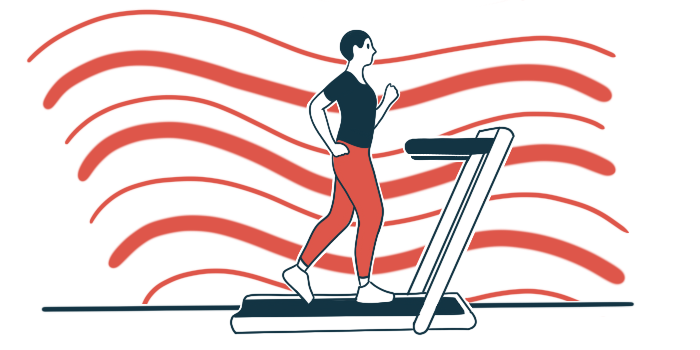Balance, cardio training project aims to improve walking ability in MS
Marquette launching high-intensity program using specialized treadmills
Written by |

A Marquette University team is leading a new project that will combine balance and cardio training with the goal of improving the walking abilities of people with multiple sclerosis (MS).
Led by Marquette biomedical engineering professor Brian Schmit, PhD, the project — which is supported by a $3.34 million research grant from the National Institutes of Health — will have MS patients perform high-intensity exercises on a specialized treadmill that’s designed to undermine balance.
Secured by safety harnesses, the participants will exercise at a higher intensity than is typically seen in MS rehabilitation therapy while the treadmill moves unexpectedly in different directions. According to the researchers, this rehabilitation program combines stamina and balance training — a combination rarely seen in clinical settings.
“Clinicians often face safety challenges in combining these two important ingredients for optimizing motor performance,” Allison Hyngstrom, PhD, project co-investigator at the College of Health Sciences at Marquette, said in a university press release.
“Results from this study could help develop a novel balance intervention for people living with MS that leverages the benefits of high intensity training and dynamic perturbation training,” Hyngstrom said.
Goal to improve balance, cardio fitness with training
MS is an autoimmune disease caused by immune-mediated damage to the brain and spinal cord, which disrupts nerve communication. MS symptoms can vary and largely depend on which parts of the nervous system are most affected in each patient.
However, people with MS commonly experience numbness and tingling, extreme fatigue, and walking difficulties that interfere with their daily activities.
The new project aims to improve balance and cardiovascular fitness in these patients — using a novel high-intensity cardio and balance training program — to help them feel more confident in their daily lives and engage in healthy community experiences.
The training study will also be supported by co-primary investigator T. George Hornby, PhD, a professor of physical medicine and rehabilitation at Indiana University, as well as other researchers at Marquette, Indiana University, the University of Maryland, and the Medical College of Wisconsin.
Participants, either at the Marquette or Indiana, will engage in 30 training sessions over six months. Assessments will include the six-minute walking distance, a measure of walking function, gait and balance performance, confidence in balance, metabolic rates, fatigue levels, and the total number of steps taken outside the clinic.
Although the goal is to test the protocol with 80 individuals by 2027, researchers are confident they will achieve full enrollment more quickly, based on positive responses from members of the MS community who want to contribute to the study. Rob Multerer, president of the National Multiple Sclerosis Society’s Wisconsin chapter, agrees.
“The MS community has an incredible thirst for knowledge and education around the disease,” Multerer said, adding that “this community is highly engaged, highly inquisitive and highly active in wanting to be a part of the cure.”
Schmit noted that Marquette has “not had to go to great lengths to find participants for our study.”
“People with MS are really engaged in finding something that might work for them,” Schmit said. “The search for treatment is common. A progressive disease changes the way you view the world, and because of that, people with MS have a tight community and an enthusiastic attitude.”
